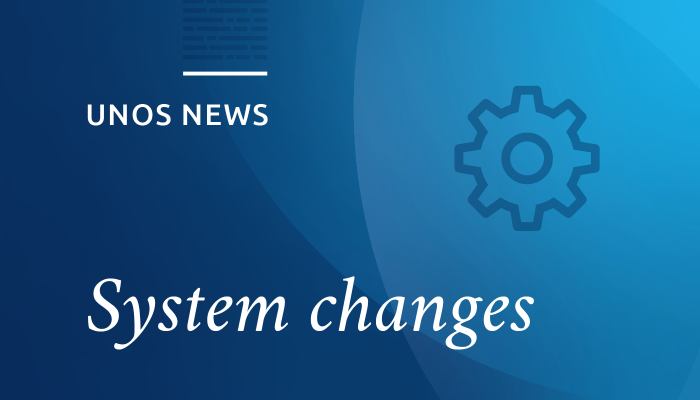Audience:
All liver transplant programs
At-a-glance:
On January 11, 2016, OPTN Policy 9.1 (MELD Score) will be updated to include serum sodium as a factor in the calculation of the MELD score. This policy was approved by the OPTN/UNOS Board of Directors in June 2014. (For additional reference, consult the July 24, 2014 policy notice.) Liver transplant programs may need to report lab values on a more frequent basis for candidates whose MELD scores increase as a result of the new calculation.
How may this affect transplant candidates?
- The addition of this factor to the MELD calculation will affect the scores of specific transplant candidates in different ways. Some will not change at all. Others may experience an increase of a few MELD points. A small subset of candidates (especially those with serum sodium values lower than 126 mEq/L) may have MELD scores increase by as many as 11 points.
- Some candidates whose MELD scores increase as a result of this policy will be subject to recertification of their lab values on a more frequent basis, as outlined in OPTN Policy 9.2. Some centers will have no candidates whose scores will need an updated recertification. A few programs with very large waiting lists may have as many as 40 to 45 candidates affected.
- At the time of policy implementation, all MELD candidates except for specific categories listed below will have their match MELD score recalculated. This may result in a change of their recertification due date. For any candidate whose recertification schedule changes such that the new date is either overdue or due within the next seven days, the program will have a full seven-day grace period to allow time to obtain and report updated lab values. So the earliest date updated lab values would be due for any affected candidate will be January 18.
- Candidates who are Status 1A or 1B at the time of the policy implementation will not be affected. Also, candidates who are inactive (Status 7) will not be affected. If the status of these candidates changes at a later date, their MELD calculation and reporting schedule will be based on the new values.
How can programs prepare prior to implementation?
Review your candidates whose scores are most likely to increase as a result of the policy. For your reference, we have added currently reported serum sodium values to the Liver Candidate MELD/PELD Report available in UNetSM under Waitlist:Reports. In addition, we have added all data fields used to calculate MELD and PELD scores, including serum sodium, to the “Create Custom Report” function, also available under Waitlist:Reports. Either report will allow you to sort candidates by their currently reported serum sodium values.
You can then compare candidates’ serum sodium values to the reference chart to determine those whose MELD score is likely to change significantly upon policy implementation. Use the following table (from OPTN Policy 9) to determine reporting requirements for candidates, based on their MELD/PELD scores.
OPTN Policy Table 9.1: Liver Status Update Schedule
| If the candidate is: | The new lab values must be reported every: | And when reported, the new lab values must be no older than: |
| Status 1A or 1B | 7 days | 48 hours |
| MELD 25 or greater (age 18 and older) | 7 days | 48 hours |
| MELD 25 or greater (under age 18) | 14 days | 72 hours |
| MELD/PELD 19 to 24 | 1 month | 7 days |
| MELD/PELD 11 to 18 | 3 months | 14 days |
| MELD/PELD 10 or less | 12 months | 30 days |
What should programs do upon implementation?
- Keep in mind that candidates’ MELD scores can change any time their lab values are updated. At the time of policy implementation, please re-run the Liver Candidate MELD/PELD Report available in UNetSM under Waitlist:Reports, to see which candidates will be subject to reporting on a more frequent basis.
Questions?
If you have policy or general questions, contact your UNOS Regional Administrator at 804-782-4800.
Contact UNOS Customer Service (UNet Help Desk), at 800-978-4334, for system and technical issues.

